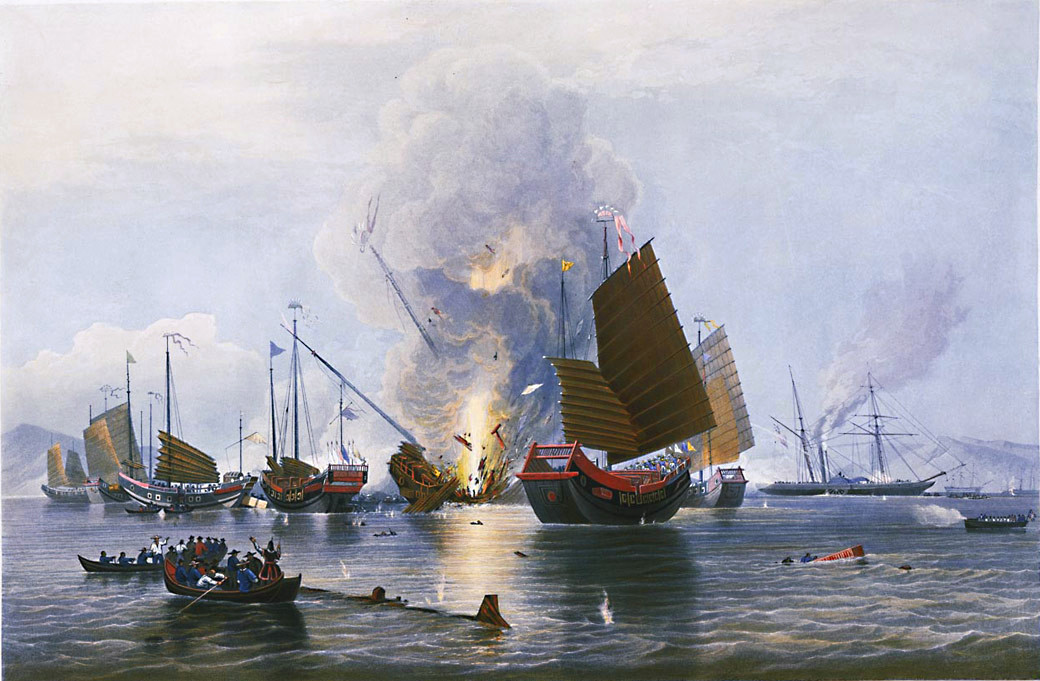Dope Inc. Britain's Opium War Against the U.S.
________
British Imperialism and the Opium Wars: The Kuomintang's Narco-State
By William Walter Kay | Global Research | June 24, 2024
Opium beguiled Sumer, earned infamy among Greco-Romans, yet never charmed China until 700 CE.
Earliest Chinese records trace the poppy's westward roots. After tobacco arrived, around 1600, smoking tobacco-opium mixtures gained popularity until 1800, when straight opium smoking took-off. (1)
In 1729 Emperor Yongzheng banned non-medicinal opium in an edict eliciting laws against mass delusion. (2) Imports of medicinal opium continued, upon payment of duties. Portuguese, perched at Macao, plied the trade with Turkish product.
Pre-1767 Indian opium exports never exceeded 200 chests. (One chest equals 60 kilos.) Brits tried smuggling Indian opium into China in 1773, but in vain.
An armed opium ship faired better in 1781. A decade later the British quit Macao for Canton. As the East India Company (BEIC) monopolized Indian opium they delegated smuggling to third parties; albeit only those carrying exclusively Company dope. (3)
Emperor Jiaquing re-affirmed the ban in 1799, bemoaning opium smoking’s climb from vagabonds to notables. Pervasive corruption and feeble policing vitiated the ban. In 1800 the British off-loaded 2,000 chests at Canton. (4)
Pre-1800 British imports of Chinese silk and tea exceeded in value British exports to China. Silver poured east. Brits reversed this flow with opium smuggling. In 1839 China imported 40,000 chests. (5)
Silver depletion, coupled with opium’s obvious ills, compelled Emperor Daoguang to solicit Mandarin advice.
Responses included "Proposing to Legalize Its Importation" by Xu Neij, Vice President of Canton’s Sacrificial Court. Xu argued:
“…smokers of opium are idle, lazy vagrants, having no useful purpose before them, and are unworthy of regard, or even of contempt. Although there are some smokers to be found who have overstepped the threshold of age, yet they do not attain to the long life of other men." (6)Opium shortens bums' lifespans. Bring it on.
Anti-opium hardliners overrode Xu. One claimed 75% of men in his area smoked the Western poison. (7)
In December 1838 Chinese officers crucified an opium smuggler in front of Canton's warehouses. In March 1839 British wholesalers watched their opium troves burn.
April-to-September saw furious diplomatic efforts and parliamentary debates culminating in an October 1, 1839 declaration of war.
China's Century of Humiliation began with British warships sinking China's navy in a nine-minute battle.
The First Opium War ended with the August 29, 1842 Treaty of Nanking.
China relinquished 21 million one-ounce silver dollar coins, ceded Hong Kong, and opened 5 ports to Western trade and residence, notably Shanghai. (British merchants griped about negotiators’ failure to legalize opium.)
Henceforth, opium sales more than covered British imports from China. Into the 1860s opium sales underwrote the Empire; yielding a quarter of British India's revenues. (8)
Early Opposition
British criticism of the opium trade surfaced in the 1840s; one pamphleteer inveighing:
"…the 'slave trade' was merciful compared to the ‘opium trade'. We did not destroy the bodies of the Africans… the opium seller slays the body" (9)Others noted opium so impoverished the Chinese they couldn't afford British manufactured wares. A Society for the Suppression of the Opium Trade coalesced in 1874 around the journal, Friends of China.
The East India Company iron steam ship Nemesis, commanded by Lieutenant W. H. Hall,
with boats from the Sulphur, Calliope, Larne and Starling, destroying the Chinese war
junks in Anson’s Bay, on 7 January 1841. (From the Public Domain)
Scolds also denounced domestic use. Consequently, the 1868 Pharmacy Act restricted opium selling to chemists. Previously, grocers' mongered opium potions and stockpiled laudanum for Saturday nights. Crusaders tolerated high society dabblers but not working class imbibers. Medics re-defined opium abuse as self-induced insanity. (10)
China 1859-1931
In 1859 Chinese opium imports hit 75,822 chests. (11)
The Second Opium War climaxed in 1860 with British soldiers torching Emperor Xianfeng's palace – roasting 300 non-combatants.
Post-war sales proceeded apace with one Westerner observing:
"In Beijing there are opium shops in almost every lane, and two or three in the larger ones." (12)Opium smoking spread from coastal cities into the interior. In 1878 another Westerner noted:
"Over the past thirty to forty years smokers have become as common in the remote countryside as they used to be in the cities. These days a town spends more money on opium than it does on rice.” (13)China imported 84,528 chests in 1879. (14)
Circa 1880-1900, the market flourished despite Britain's exit – which resulted from China's switch to home-grown opium, and from Chinese merchants connecting with Persian suppliers.
Please go to Global Research to continue reading.
_________
The British took poppy seeds back to Britain to Kew Gardens where they were hybridized for potency:

No comments:
Post a Comment
Note: Only a member of this blog may post a comment.